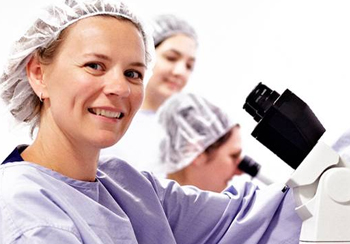Dr Frank Quinn IVF Interview

Dr Frank Quinn IVF Interview
Fertility treatment (Assisted Reproductive Technology or IVF) has evolved tremendously since the first Australian IVF baby was born over 30 years ago. Within those 30 plus years, we have never seen the subject of fertility and its treatment as prominent in the media as much as it is today. From leading reproductive and scientific technology to sperm donor rights, from increasing advanced maternal age to the rise in single women and same-sex couples starting a family, the issue of fertility is certainly a topic of significant media interest.At the centre of major technological advances are the three leading fertility clinics across NSW (IVF Australia), Victoria (Melbourne IVF) and Queensland (Queensland Fertility Group). This group brings together Australia's leading specialists, scientists, researchers and support staff to provide the very best in fertility care and related services.
These renowned clinics have collaboratively shaped fertility treatment in Australia and abroad and are paving the way for the future of fertility treatment.
So where is the future of fertility heading? Australia's leading minds share their insights:
Fertility Enhancement
Continued improvement in scientific techniques to select the best eggs, sperm and embryos significantly enhances fertility treatment. At the centre of this is digital high magnification of sperm and Oosight Technology.
Fertility Preservation
Having a family should not stop with a cancer diagnosis. Fertility preservation options for women undergoing cancer treatment include freezing eggs, freezing embryos and freezing ovarian tissue. There are now several studies suggesting that ovarian tissue freezing could be a useful treatment option.
Safe-guarding Fertility Future
Egg freezing is also an option for women delaying motherhood either by choice or circumstance, using the same technique as egg freezing for medical reasons. Improvements in freezing techniques provide women with more options to preserve their fertility.
Pre-implantation Genetic Diagnosis
Pre-implantation Genetic Diagnosis (PGD) can test for a multitude of single gene and genetic disorders including Huntington's disease and cystic fibrosis amongst others. A recent breakthrough known as Advanced Embryo Selection, allows simpler, faster and more comprehensive testing of genetic diseases, which continues to provide better results for patients.
Natural Killer Cells Research
Extensive research is underway assessing the effect of Natural Killer Cells and a woman's immune system on recurrent miscarriage and implantation failure
Interview with Dr Frank Quinn
Dr Frank Quinn, Fertility Specialist and Clinic Director for IVFAustraliaQuestion: Can you talk about the different types of fertility treatments?
Dr Frank Quinn: We offer everything from low to high tech fertility treatments. Low tech being things like monitoring a woman's menstrual cycle, working out when she ovulates and advising the couple as to the best time when to have intercourse. The next stage up from that, a little more invasive, is sometimes women don't ovulate so we may prescribe either tablets or injections to ensure a woman ovulates. The woman then goes away, has intercourse and then her results are considered.
The next level up is inseminations, and that's where we give women injections to try to grow 2-3 eggs during a menstrual cycle, we then monitor the cycle to work out when she ovulates and then just prior to ovulation, we get her partners sperm, wash it down and then place that into to the uterus and try to get her pregnancy, that way. After inseminations then you have IVF, this is where we giving women injections, to try to get about 10 eggs to grow.
We also offer third party reproduction, which is things like donor sperm, surrogacy, which is not as common but is still available.
Question: How successful is IVF?
Dr Frank Quinn: The least invasive treatments such as inseminations give you pregnancy rates of around fifteen per cent; it is dependent on the woman's age though. Natural fertility and fertility treatments will decline with age.
Typically IVF has a pregnancy success rate of about 45 per cent for women in their twenties, IVF for women in their late thirties about a third, and then for women in their forties, it's around 15 per cent.
The success of IVF after the age of 44 is very low, almost zero.
Question: What are some of the causes of infertility?
Dr Frank Quinn: Commonest causes are things like male infertility and men having a low sperm count. On the female side there can be blocked tubes, pelvic infections, endometriosis, or women not ovulating (not releasing an egg), the most common cause of this is a condition called polycystic ovarian syndrome.
Question: How can some of these causes be avoided?
Dr Frank Quinn: Definitely the infections can be avoided; sexually transmitted infections in men and women can block the tubes, or block the ducts for ejaculation, and affect fertility. Things like safe sex and protecting again STD's go a long way to preserving fertility. The other issue is things like alcohol and smoking, women who smoke have a much lower fertility than women who don't smoke. Weight is another issue, particularly with women with polycystic ovaries who don't ovulate; if they're overweight and they lose weight then they can often ovulate on their own and they don't need medication. So having an ideal body weight, healthy diet, regular exercise, not smoking and avoiding the risk of STD's will go a long way to minimising the risk of fertility issues.
Question: Can you talk about the techniques you use to expand options for women who want to preserve their fertility?
Dr Frank Quinn: For women who want to preserve their fertility the commonest option is actually freezing their eggs. Women go through the IVF treatment cycle and we collect a batch of eggs, and if they don't have a partner then those unfertilised eggs are frozen and saved for a later date. Pregnancy rates for that are also very dependent on the age of the women; sometimes we only see success rates of around three or four per cent per egg. So it's not a great form of reproductive insurance, but particularly for women who are about to go through chemo-therapy and run the risk of an early menopause, it certainly is an option for them. The other issue with fertility preservation is that it's not covered by Medicare. Medicare does not deem women preserving their fertility as a medical condition and therefore you don't get the Medicare rebates from it.
Question: How common is this method of fertility preservation?
Dr Frank Quinn: It is yes, as more women are becoming aware of it, particularly women going through chemo-therapy, they may opt to freeze some eggs prior to the chemo.
Question: What advice do you have for couples going through the IVF process?
Dr Frank Quinn: The advice we have is to education them, we give them written information and we sit down and explain the nature of IVF. We run information nights just to let them know information on everything including: what the treatment entails, how much it costs, what are the emotional consequences and the risks and complications from IVF. Before couples embark on this journey they have a pretty good idea of what IVF entails.
Also we offer counselling to all of our patients undergoing IVF in an effort to talk through some of the social implications and trying to minimise the stress of the IVF process.
Question: What costs are associated with the IVF process?
Dr Frank Quinn: Typically at IVFA an IVF treatment cycle is about $7,500 and if they've got private health insurance and a Medicare card they tend to be out of pocket closer to $3,000 for a cycle.
Question: How many cycles is average before success?
Dr Frank Quinn: Probably around two but once again it is dependent upon the age of the women, a woman in her twenties with a 45% pregnancy rate is going to get pregnant on average a lot quicker than someone who's 43.
Question: How is your clinic paving the way for the future of fertility treatment?
Dr Frank Quinn: Certainly at IVFA we spend a lot of money in research and development, so we've published a lot of papers and presented a lot of fertility meetings both locally and internationally. But out scientists in house have developed a few treatments, one of them is a higher-magnification of the microscopes you use when you inject sperm into the egg; sometimes men have got a lower sperm count and you need to do a type of IVF treatment called "ixy" where you inject the sperm into the egg and this new microscope which has this enhanced magnification helps scientists select which sperm to inject into the eggs. We're finding very encouraging results from that, particularly when there is a history of recurrent miscarriages. That is one technology that we've developed in house.
Another one is a polar-scope, which we use to look at the eggs before you inject them to see if there are chromosomes, because a lot of eggs don't have chromosomes. So that assists in the selection of IVF embryos as to which ones you transfer back into the uterus.
A big area at the moment is a micro-ray technology or PGD where couple are not getting pregnant or have genetic disorders or have a history of recurrent miscarriages; when we do IVF we biopsy their embryos on day three meaning we take one cell or two cells out of their embryo, we look at the DNA we send that embryo away, and we get a result back before we do the transfer on day five. We know a lot of embryos are genetically abnormal so with this technology we are able to select more normal embryos to be transferred back into the uterus to try to help our patients get pregnant sooner.
For more information see www.ivf.com.au
Interview by Brooke Hunter
MORE
- Midwife Cath Interview
- Colin Anson Interview
- Why Good Health is Essential to Increase Fertility
- 5 Beauty Products to Avoid When You are Pregnant
- Looking After You, Looking After Your Baby
- Andre Carvalho International Pregnancy and...
- NRL Player v Mums
- Safer Internet Day
- The Pink Elephants Support
- Edwina Sharrock Birth Beat Interview
- Make Mums Group Dad-Friendly



